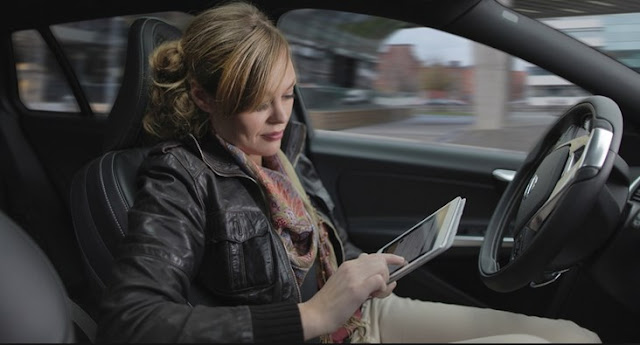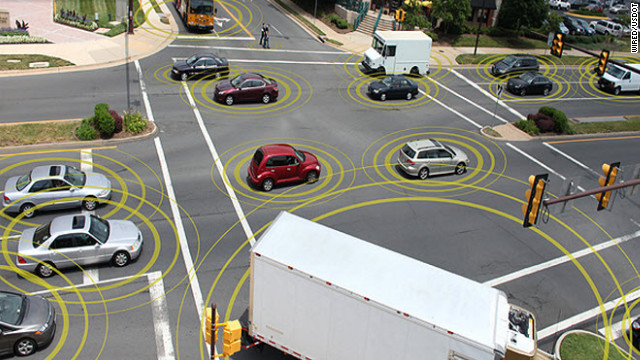Written by Sam Lessin, wlessin.com
Playing it through, it seems like there are going to be three interesting stages in the deployment of self driving cars:
They will be available for purchase as an individual, but will require a licensed driver to be sitting behind the controls and be responsible legally for the actions of the car. A small but meaningful percentage of cars will be self-driving. (Maybe in 5-10 years)
The requirements for a human "backup" operator / legally responsible operator will be loosened over time to the point that eventually you will be able to sleep in the back, shuttle around your 5 year old, be enormously intoxicated in a vehicle, etc. They will still be owned by individuals. A very large percentage of cars will be self driving in the US - or at least SF -(Maybe in 25 or 30 years)
The transportation cloud will become real... People will not own cars at all... When you need to move from point A to B you will simply request a driverless vehicle and one will appear for you ... Like Uber does today -- but the real value will come not from shuttling around people, it will be from the ability to shuttle around things / objects / tools you might need in new ways which are currently economically inefficient.
Thinking about it - my sense is that things only really start to get interesting at all in stage #2 - but then it is really stage #3 that changes the landscape of everything (real estate, ownership, retail, etc) as efficient logistics will dramatically shrink our collective demand for most 'stuff' / atom based possessions... to explain:
Stage #1 - where cars are self driving but require a legally responsible licensed driver - is just petty boring / the cars are a novelty alone in most ways. You aren't going to be able to multi-task in your car any more than you can today largely because there is going to need to be legal liability setup when cars crash or injure someone -- almost certainly that will put the burden on the operator for the sake of equivalence to non-self driving cars...
So, just as there are annoying blocks on in-dash GPS systems, which tell you not to use them while you are driving -- self driving cars are going to initially roll out with so many alertness checks, checks for consecutive time of driving without a brake / etc for the driver that it is possible they will require more mental attention to operate than traditional cars!
Stage #2 gets a lot more impact on how cities are organized and how we travel long distances. The airline industry will suffer and the value of city real-estate will decline... The value of real estate outside of cities will increase as the burbs get more accessible (and more fun to live in).
Airlines are going to suffer because the math will tip in favor of driving most places vs. flying (e.g. LA to SF) -- the math on flying will still work for very long hauls / clearly intercontinental travel -- but far fewer routes than currently the airline industry supports. (side point, this also means favoring big jumbo jets on key select routes, not the micro-jet / regional airport model of the world).
Cities are going to suffer (and suburbs / the boonies flourish) because commuting for work and fun will become faster and easier to manage. There will be less of a premium on living where you work or play. Also, it is quire possible that retail and bars will spread out a lot more. Right now one of the challenges of the suburbs is bars / drinking. It is very hard to 'go out' outside of a city with cabs -- but if the cars drive themselves FAST -- no worries!
On a personal level... right now you have to budget about 45 min to get from my hometown to mid-town Manhattan. That is too long / i wouldn't want to live there now and do that commute and therefore would prefer to live in the city; however, if it reliably took 15 min / which is completely possible with better traffic management, parking, etc. AND I could get things done during that time -- I would much prefer to live in Englewood NJ than Manhattan.
Stage #3 is where all the real fun occurs. The real implication of truly driverless vehicles is NOT hanging out in the back seat... the real impact is going to be that no one will own cars anymore at all... you will just have access to transportation capabilities when you need them -- and that is going to be a big part of remapping the whole economy. Here are some ideas:
No more owning a car personally.
You will just pay for transportation instance when you need (with dynamic pricing and all that marketplace jazz)
You will not need a car, you will just have effectively 'uber' everywhere at very low cost and very low latency. Take 'uber' as the human-capital-heavy version of exactly this today in small pockets like SF. I would vehemently assert that if you are price insensitive- Uber is way way better than driving your own car in SF... in fact, if I only ever traveled in SF I probably would have already gotten rid of my car in preference to Uber. This is as much because SF parking is terrible, but that is still a big part of the equation.
The problem with Uber is of course that it only works in very high density places. Point in case, when i went to Chicago (a huge city with a lot of density, but a lot less uber-car-density) uber was a disaster... it took me 30 min to get a vehicle, etc -- would have been faster to drive -- and of course you can't really give up your car until uber has you covered truly everywhere.
Fewer cars in the world.
The more efficient we are at allocating cars / keeping them occupied via #1, then the fewer total cars we need in the world. I don't know the %, but i have to assume only a very few percent of cars are being operated at any given time / are actually moving around. If we increase efficiency in transportation it will drive down the number of cars we need as a society in total pretty dramatically.
This is actually going to be quite bad for the auto industry (not unlike how Airbnb is potentially bad for the hotel industry) -- the are going to have to shift their model dramatically to become service companies / either servicing fleets of cars or providing end-to-end transportation cloud rather than car manufactures that sell to all consumers. My bet is that we need as a society like 10% of the number of vehicles we currently have.
Also bad for the auto industry -- if you don't own a car then you care a lot less about what you 'drive'. Some fanatics at the high end I am sure will have premium car access and want cool or differentiated product -- but I bet most people will want to get from point A to B.
Parking becomes reclaimable real-estate.
An absolutely enormous portion of US real-estate is dedicated to parking lots an garages. Once no one needs to own cars anymore and is effectively uber-ing everywhere you don't need those garages anymore. This means converting all existing garage space to more living space, parks, etc.
People will live in smaller houses.
| interior of Mercedes-Benz f 105 Luxury in motion concept car |
People will own fewer things.
This is the real kicker: you'll be able to rent everything once everything can move on its own, and we'll need less stuff as a society in general.
Since the beginning of the Internet people have wanted to create local collectives to share stuff. We don't all need drills, we don't all need rakes, etc -- the thought was that with communication horsepower we could share 'stuff' more efficiently / better and would thereby need less of it. This has worked in a few cases, but generally fails because information about who has what is only part of the equation -- you also then need to move the stuff around, and that is a huge pain in the ass!
That said, once the stuff can move itself with self driving cars (and probably some drones to boot)... then finally that dream of sharing opened up by the Internet will become real -- because it will be pretty damn efficient to share atoms, not just bits.
So, where above the idea was that we will all have storage units outside of the cities and call up things we want from our private stores when we need them / want them rather than living with them -- the reality is that i bet those storage warehouses will be communal / rental model based. Whenever we want something we will declare it and it will be delivered to us for use... and when we are done we will ship it back to the warehouse for servicing / storage and someone else to call up when they need it.
So, at stage #3 it seems highly likely to me that without massive population growth, etc. the amount of 'stuff' we will need as a society (and our attachment to stuff) will decline radically (with serious implications for the whole economy)
We might not get through this whole cycle fully in our lifetime. I hope we even get to #2... but #3 is going to change everything / be unbelievably disruptive to basically every business that sells atoms to consumers.
NEXT Google self-driving cars drive like your Grandma





